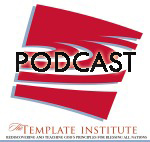The Old Testament Template: Chapter 11
Education
“Fix these words of mine in your hearts and minds; tie them as symbols on your hands and bind them on your foreheads. Teach them to your children, talking about them when you sit at home and when you walk along the road, when you lie down and when you get up. Write them on the door frames of your houses and on your gates, so that our days and the days of your children may be many in the land that the Lord swore to give your forefathers, as many as the days that the heavens are above the earth.”
Deuteronomy 11:18-21
“Love the Lord your God with all your heart and with all your soul and with all your strength and with all your mind”
Luke 10:27
Education, like communication and the arts, is difficult to isolate and study apart from other areas in scripture. Everything in scripture is about learning. The Bible is a book inspired by God for our education and understanding of His ways. So, again, with this chapter we do not have one scripture that serves as an example, but will look at a scriptural overview of the subject. It is clear that God is a God of knowledge. He can be known. He wants to be known and He wants us to know Him in all that He has made. You could say that inquiring minds are godly minds and one of the primary marks of discipleship is expressed in questions – the desire to learn and know.
We Can Know
Epistemology is a big word meaning the “science of knowing.” All philosophies and religions ask, “Can we know?” and, if so, “How can we know?” God’s Word says, “Yes, we can know!” And we will know through a combined process of discovery and revelation. The basis of modern science – that the material world is real, measurable, and discoverable – is a biblical concept. The Islamic world can copy technology, but has a very hard time creating and maintaining it because they believe there are no fixed laws by which God governs the material world. There is only the will of Allah. Hinduism and Buddhism teach, basically, that the material world we live in is not real and not important. Many Christian doctrines get dangerously close to this split concept today. But the Bible teaches that truth is discoverable and knowable and that, when applied, consistently results in the same consequences. God knows all truth and all truth, in any and every domain of life, reveals God. Mystery in scripture is a result of the difference between what we know and what God knows, not what is knowable. In His Word, God originates and encourages wisdom, knowledge, and education.
Education Reveals The Attribute Of Wisdom
For the Hebrew mind discipled by the teaching of Moses the concept of knowing includedapplication. This is far from most worldviews today. Most educational systems are based on the concept that you can know by retaining information about a subject without needing to apply it. As a result, the working world acknowledges that university graduates can do nothing when they first come to work. They have to be taught how on the job. This greatly concerns educational professionals worldwide and has become a subject of debate and study. This same idea – that data is knowledge – has led to a generation of Christians who say they know God but still don’t know how to obey Him. Many have the concept that you can know the writer of scripture without applying any of His principles, that you can be saved but not demonstrate any fruit of that conversion in your daily life, or, as some say, “believe like God and act like the devil.” None of these are biblical assumptions.
From Genesis through the book of Revelation, God reinforces the concept that knowledge is demonstrated in action, faith in works, learning in growth, wisdom in love. There is no scriptural basis for a “blind leap of faith.” Existentialism says you cannot know, you can only experience. Jesus refused to leap off the temple at Satan’s temptation. Jesus understood that you could know the will of God without taking the leap. The “experience” of leaping was not the only way to know. For God, wisdom is not just choosing right, but understanding why it is right. God’s goal is not, finally, obedience but agreement. As parents we understand that in the beginning we must just say, “No,” to a child who is about to put his little hand on a hot burner. We try to convey that it is hot and he will be burned, but when he is small, we are satisfied if he just doesn’t touch it. As he matures we are looking for him to become aware of what we mean by hot and, hopefully without permanent damage, begin to agree that burning flesh is a bad and painful thing. Finally, we want him not to touch the burner because he agrees that it would not be a good thing to do.
If we are growing in God, we’ll need to ask about fewer and fewer things because we’ve learned God’s thinking on those subjects. This does not mean that we no longer are inquiring of God. It means we no longer ask God the same question because we come to know and agree with His answers and reasoning. We will learn and ask God about things that are new for us because we do not yet have God’s mindset on them.
The Old and New Testaments are full of admonitions to add to the experience of knowing God personally, to gain information about God revealed in creation, history, and the written word. Paul writes of “renewing our minds”1 and “taking every thought captive and making it conform to themind of Christ.”2 In 1 Corinthians 14:15 he encourages the church to pray with their minds, with understanding, as well as in tongues. In Acts the people of God were gathered in “one heart and one mind.”3 Paul warns of a “sinful mind” in Romans 8:6 and admonishes the Romans to have a “mind controlled by the Spirit.” The entirety of Proverbs celebrates the blessings of wisdom applied to our lives and encourages the life-long pursuit of her. Over and over again in the books of Moses the Israelites are admonished to study and learn the ways of God revealed in the Torah and to apply them to their lives. Jesus had mastered these principles by the time he was twelve and astounded the priests with His wisdom.4 One difference between Jesus and the Pharisees was that they quoted the Law, but He explained it. He understood it. He could apply it to daily life. Jesus calls His disciples to, “Ask, seek, knock…” to inquire and learn of Him and His Father. All of the prophets admonished Israel to turn back to the principles laid down by God through Moses and to see the blessing of God return.
Repentance Means Changed Thinking
The New Testament word repent is often taught to mean change direction. The actual translation of the word from the Greek would be change thinking. In other words, the key to changed behavior is changed thought, not the other way around. When we focus on actions, we become obsessed with the appearance rather than the substance of our lives. We look good but we are unchanged on the inside. God’s concern is not so much with the external, but who we are internally. God desires to win us to His view of reality and truth so that we are like Him because we see reality as He sees it.
In chapter 10 of 2 Corinthians Paul argues that our warfare is a warfare, in part, of the mind. “For though we live in the world, we do not wage war as the world does. The weapons we fight with are not the weapons of the world. On the contrary, they have divine power to demolish strongholds. We demolish arguments and every pretension that sets itself up against the knowledge of God, and we take captive every thought to make it obedient to Christ.”5 Our warfare with this world is a warfare between idea’s, and a warfare to get a grasp of what reality is. If we are to stand and be an influence, we must not only act as Jesus would act, we must think as Jesus thinks.
Education And The Family
In an “Economist” article in the late 90’s, researchers wrote of discovering that successful learning in the classroom had little to do with how much money or time was spent on the subject. They found that less learning could take place when more time and money had been spent and vice versa. One determining factor for success or failure was the method of teaching. Parental support was another factor that educators worldwide agree is important. If parents are involved in the child’s education the child will learn more. Scripture overwhelmingly agrees with this discovery; the authority and responsibility of parents in teaching their children is abundantly clear.
“In the future, when your son asks you, what is the meaning of the stipulations, decrees and laws the Lord our God has commanded you?” tell him:
Deuteronomy 6:20-25
We were slaves of Pharaoh in Egypt, but the Lord brought us out of Egypt with a mighty hand. Before our eyes the Lord sent miraculous signs and wonders – great and terrible – upon Egypt and Pharaoh and his whole household. But he brought us out from there to bring us in and give us the land that he promised on oath to our forefathers. The Lord commanded us to obey all these decrees and to fear the Lord our God, so that we might always prosper and be kept alive, as is the case today. And if we are careful to obey all this law before the Lord our God, as he has commanded us, that will be our righteousness.
Deuteronomy 11:19-21
Teach them to your children, talking about them when you sit at home and when your walk along the road, when you lie down and when you get up. Write them on the door frames of your houses and on your gates, so that your days and the days of your children may be many in the land that the Lord swore to give your forefathers, as many as the days that the heavens are above the earth.
Children Absorb Their World View
As we discussed in the chapter on Family, in those formative years from birth to four, when children absorb the view of reality around them, the parents’ perspective is the critical factor. The child will take in the values and beliefs that are modeled in the home, whether they are intentionally taught by the parents or not. The child will believe the reality parents convey and will copy it. They have no choice at this stage of growth because they are exposed to no other reality. Parents will imprint their actual, not necessarily desired, value system on the child. For this reason God emphasizes, over and over again, the importance of parents teaching their children God’s view of life in the everyday activities of eating, walking and working together.
I am not proposing that scripture indicates all parents should home school. That is just one method of education and the Bible does not put forth a single model. However, the influence of parents in the child’s life is emphasized in the Word. Based on their parents’ view, children will go to school believing they are smart enough, or too stupid, to learn. They will enter school believing learning is important and exciting, or boring and a waste of time, based on their parents’ view. When they come home, the importance of homework will be reinforced, or devalued; home will be a place that promotes learning or a place that disrupts it. From home they will take the idea that something can be learned from everyone and that everyone’s ideas need to be evaluated or, perhaps, they will take the belief that there is nothing to learn from anyone. Before they ever go to school, children will believe in a God who reveals truth, or that there is no truth.
Have you ever wondered why God spends so much time on the early life of Daniel and his training in Babylon? Daniel and his three friends are captive aliens in Babylon, taken from their families as adolescents into the palace and service of the King. They attend Babylon University where they study witchcraft, divination, and other sordid subjects, and they are at the top of their class. They are surrounded by a pagan, idolatrous culture, yet none of them absorbs any of it. How do we explain this in a world where Christians and non-Christians alike are declaring television, movies, music, advertising, and schools to be the formative influences on young people’s minds? How did Daniel and the others stand in this Babylonian environment? The answer is simple and profoundly emphasized in scripture: they took their values with them. They continued to weigh the values around them in captivity with what they had been taught and, more importantly, modeled in their homes. Scripture indicates that if children are the victims of the world around them, there can only be one explanation. They are not being given the tools at home to evaluate the messages coming at them from the world, and they have not been given the confidence that they, with God’s help, can know and discern truth.
Education And Government
For several decades Christians in my country have been very vocal about the damage to our public school system caused by removal of prayer from schools. I do not want to argue for the absence of prayer, but I do want to discuss the thinking behind this argument. First of all, from God’s perspective you cannot outlaw prayer; you can only outlaw prayer meetings and praying out loud. God has given no authority to government to rule over our hearts and minds. We can think and believe what we like. The institution of government can only attempt to control our outward actions. For decades we have traced the decline of our schools and education in the U.S.A. to a law banning prayer when law cannot ban prayer unless we agree to it. The law is unjust, but is it catastrophic?
On the other hand, something else took place in the U.S. that perhaps had far greater implications. The authority of education began to move consistently from parent- and teacher-based local organizations towards a national association for education. This shift in authority from family to government was far more strategic and dangerous than outlawing prayer meetings. God gave no authority to governments over our children. God gave that authority to parents. Governments are created by God to deal with the masses. By design, that is their function. Education, by its nature, is an individual process. Like social issues of poverty and drugs, if you ask the government to deal with it, you will have the most expensive and least effective programs. The government will design a program that attempts to deal with everyone in the same way…much like a prison system. But social problems, drugs, and education are individual problems that can only be solved effectively by addressing the individual. God designed the family to deal with individuals. Parents can delegate their authority to a public school system, but if they abdicate their support or if their role is ignored or even denied by the institution, those schools have very little legitimate authority over the children.
The same is true when parents abdicate responsibility for their child’s education to a Christian school. God does not give the church the responsibility to train children. He gives that responsibility to parents.
Education And The Laws Of Human Nature
In education and in communication it is important to look at how God has created human nature to work. Today’s media culture emphasizes the power of persuasion to the point that we begin to think of ourselves more as recorders, taking every message in and conforming to it. When a crisis hits, we blame the impact of the media, or schools, or postmodernism, and the way youth think today. We talk about “secular” education as though it is a power in and of itself.
This is not the view of man conveyed in scripture. In the Bible, the human race is given great authority, the authority to accept or reject the influences around them. Nothing in God’s Word indicates that it is easy to make our fellowman do what we want. Far from it. Scripture emphasizes man’s ability to discern, and accept or reject, influences around him. In the next chapter on communication we will discuss brainwashing, subliminal communication and the “recordable man” theories. But for the sake of our discussion on education, let me summarize by saying that, once we move on from those very formative first years, we learn what we want to learn. We are far more like filters than sponges. This is so profoundly true that communists in the former Soviet Union can drum doctrine into school children for seven decades and yet no more than twenty percent of them believe in communism. Generations of black children in South Africa were taught that they are to have no role in the political life of their nation, yet almost none of them believe it. Maori and European children in New Zealand attend the same schools and come out with incredibly different world views.
Educators I’ve talked to all over the world agree that the two most important keys to learning are the parents’ attitude and involvement, and the motivation of the child. The biblical view is that every child is gifted, every child can learn, every child has value, and every child has the right to reach its full potential. But it also emphasizes that we are created by God to be free and we make choices whether to hear (learn) or not. The greatest influence on those choices will be the first few years in our home environment.
Why do I emphasize this? Because we have to recognize what an education system can and cannot do. We have to realize the importance of parenting. We have to give schools their proper place in God’s scheme of things, but not expect them to work miracles or work in isolation. And, we have to put our faith for the future in more than education.
STUDY HELP:
Themes to consider when studying and coloring the subject of education in scripture: teaching, learning, remembering, mind, thought, reason, nurture, wisdom and family.
The domain of education reveals: The Great Teacher-Rabbi
The primary attribute of God revealed in education: Wisdom
God governs this domain through: The laws of human nature
The color I used: Brown
WORKING VOCATIONAL MISSION STATEMENT:
To provide for the development of the God-given gifts in every child for the service of their fellow man and society, believing every child is gifted by God and has the right for those gifts to be developed to their highest potential. Great issues include: Value-based integrated process with family involvement and support.
A NOTE TO ALL BELIEVERS:
Do you love learning? God does! Are you interested in everything? God is! If we are to model Jesus to those around us, part of that modeling will be His passion to know His Father in every area of life. One of the most tragic effects of the split gospel is the loss of interest in most of life. Often it seems that the only thing a believer can talk about is church, prayer, heaven, and hell. Not that those are not important. They are! But, were Jesus here, He would be ecstatic to be in the first generation to actually see through the Hubble telescope a star being born, or dying. His Father created that and He would worship Him in all that the heavens are still teaching us. He would stand in awe at the way His Father created the DNA of the human species. He would ponder the fact that every cell can reproduce every other human cell and what that says about the nature and character of God. Jesus would love the idea of going to other planets and discovering more of what the Father has made. He would be reading, listening, eager about what is going on in His Father’s cosmos and He would be excited about what we are learning and how God wants to use that insight.
God has made us with the capacity to learn – or to refuse to learn, to know – or to refuse to know. From Genesis to Revelation God portrays Himself as the Lord of knowledge, revealed in all the truths of the universe. Choose to think like God! Choose to be interested. Model Jesus’ love of learning and you will make those around you hungry for more.
Children love learning unless they are taught to be afraid of it. All it takes to learn is willing- ness to admit you don’t know. That is the humility of a child. Children naturally ask questions. They have to be taught to feel foolish about the eagerness to know things. God loves questions and calls us to “ask, seek, knock”…and become like children again.
A NOTE TO EDUCATIONAL PROFESSIONALS:
Wherever I speak on this subject educational professionals ask me what they can do to influence their education system. The first thing I tell them is to study God’s word until they believe they see learning from God’s perspective. Zeal without wisdom is not good. Secondly, whatever their position, they can seek more parental involvement. As a teacher, they can communicate with and seek communication from their students’ parents. They can organize parental dialogue about the school system and their classroom. In many countries parents can be invited to volunteer and add to the curriculum and classroom management. How we do it is not as important as what we believe is essential. The critical thing is that we understand God’s principles. The applications will be dynamic to our community’s specific situation.
I love the story Bruce Olson conveys of his experiences with the Motilone Indians in South America.6 This tribe was Stone Age and almost entirely isolated from the outside world when Bruce went to live with them. An amazing move of God took place among these people and the entire tribe was converted to Christ. As they grew in God and began to understand more of the importance of scripture, they believed they needed to tackle the issue of education and learning to read. Rather than imposing a system on the Indians, Bruce Olson asked how they wanted to go about the process of education. The tribe decided that the elders needed to learn to read first so that they could then teach the children, otherwise the fiber of authority in the tribe would be destroyed. If the elders learned first, the importance of learning would be enhanced and they would be able to model for the children the value of learning to read. What a great application.
As administrator and school board members we should be seeking influence and policy that brings back parental involvement and authority in our school system. This is not to say that government does not have a role in organizing and overseeing an educational system. It is to say the system must be as parent- and local-based in its authority as possible. As a local principal you can create a voice for parents whether in a formal or informal way. You can create a communication strategy that helps them feel informed and involved and you can help your classroom teachers do the same. I do not mean to imply that getting parents involved is an easy task. Apathy abounds. However, the more the parents are involved, the healthier the school system will be.
1. Romans 12:2
2. 2 Corinthians 10:5
3. Acts 4:32
4. Luke 2:46-47
5. 2 Corinthians 10:3-5
6. Olson, Bruce, “Bruchko”, YWAM Publishing, May 2005







